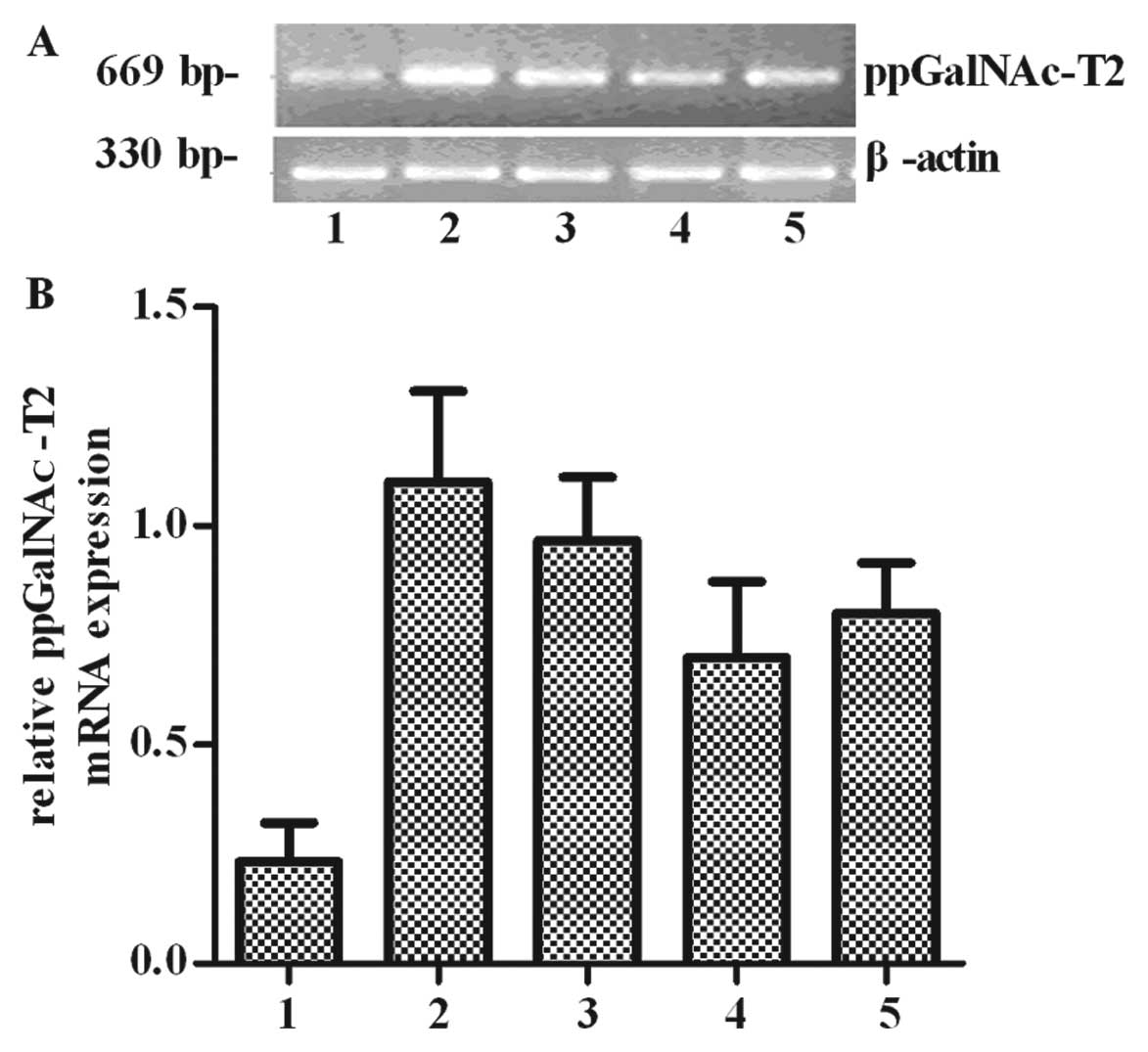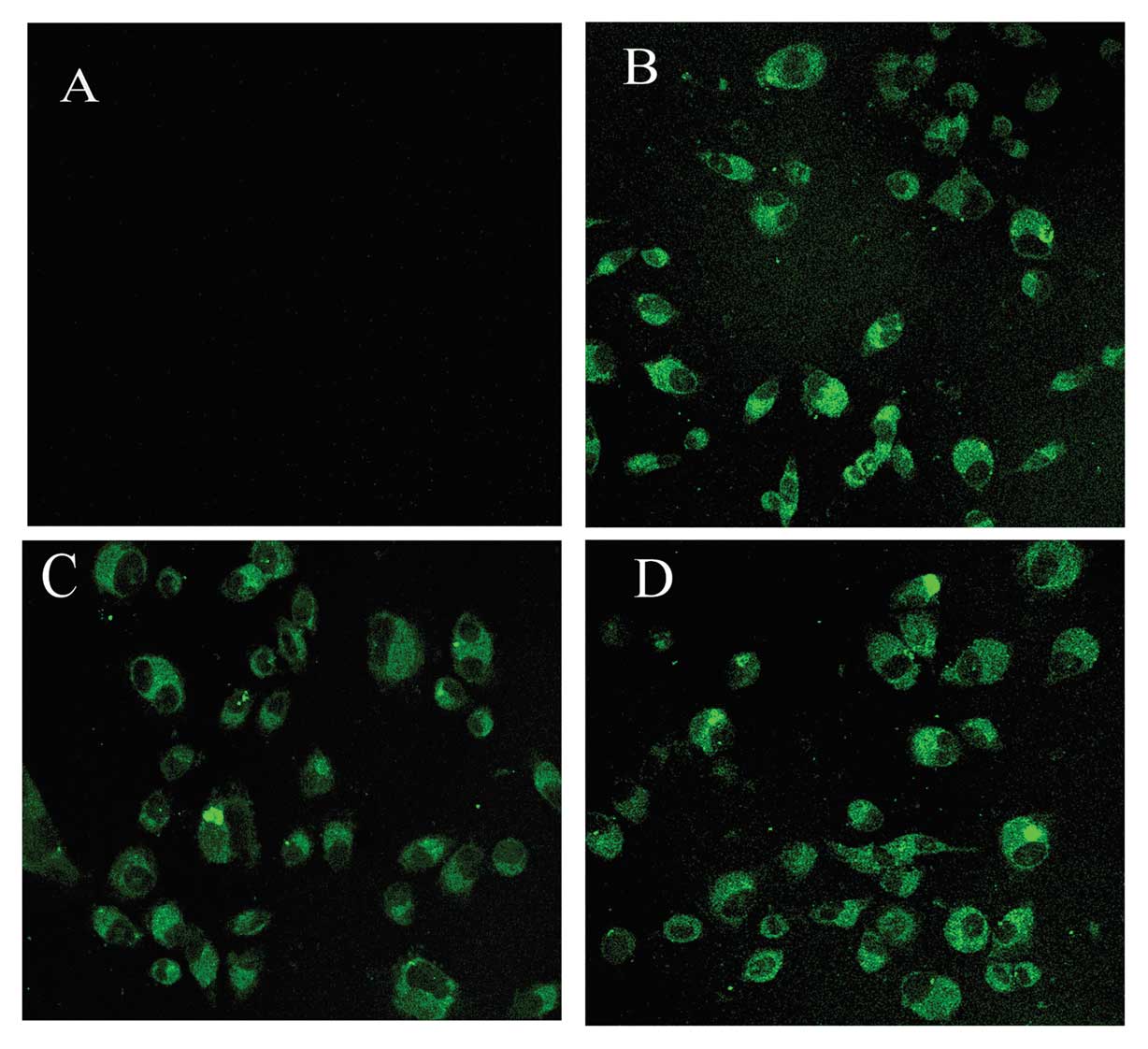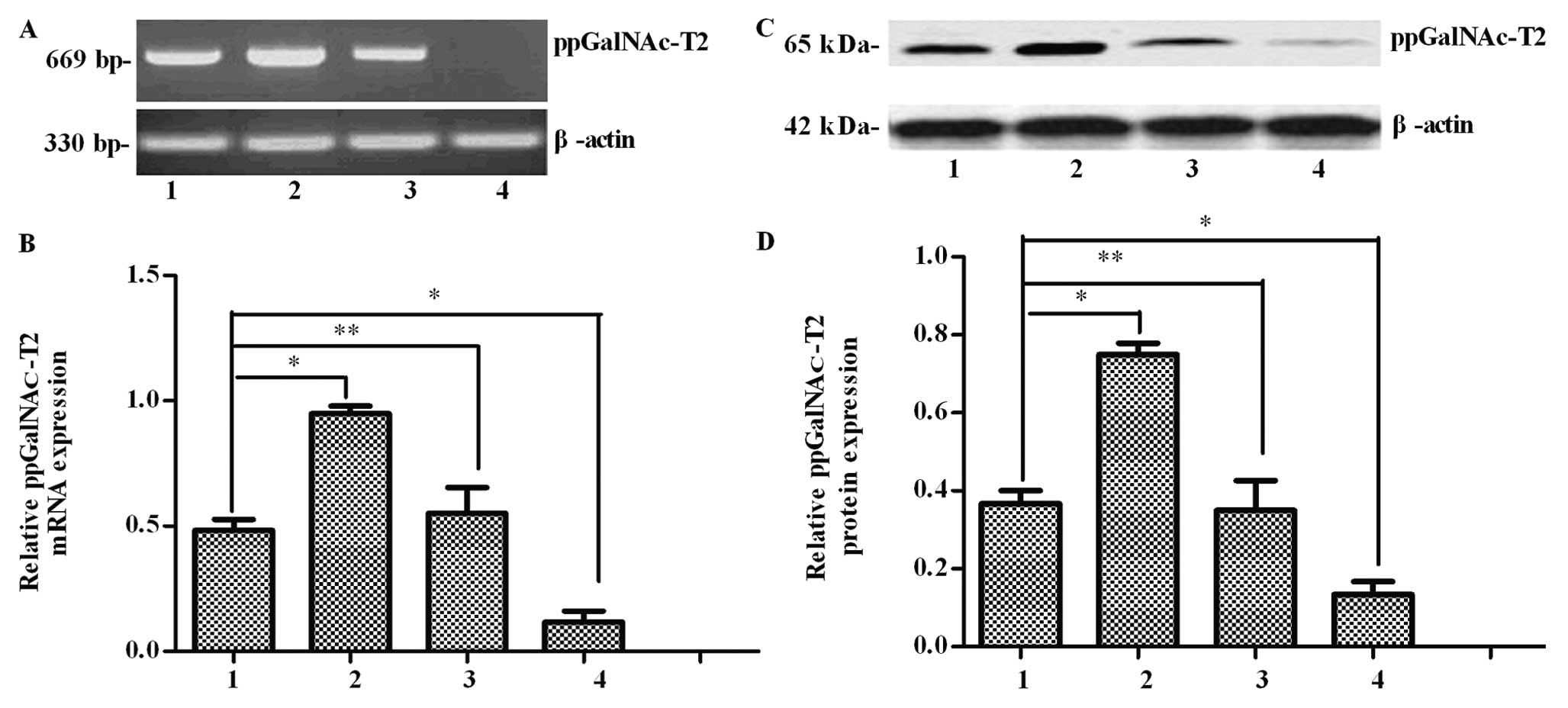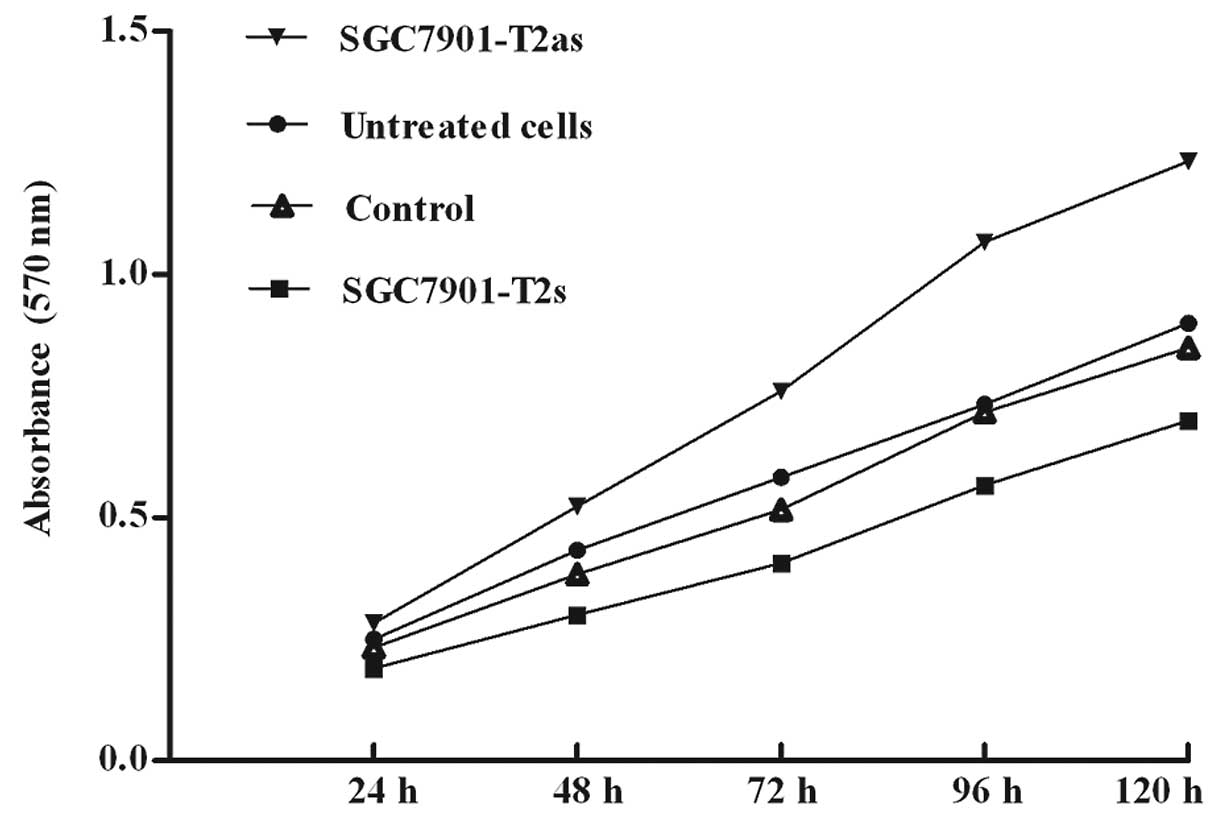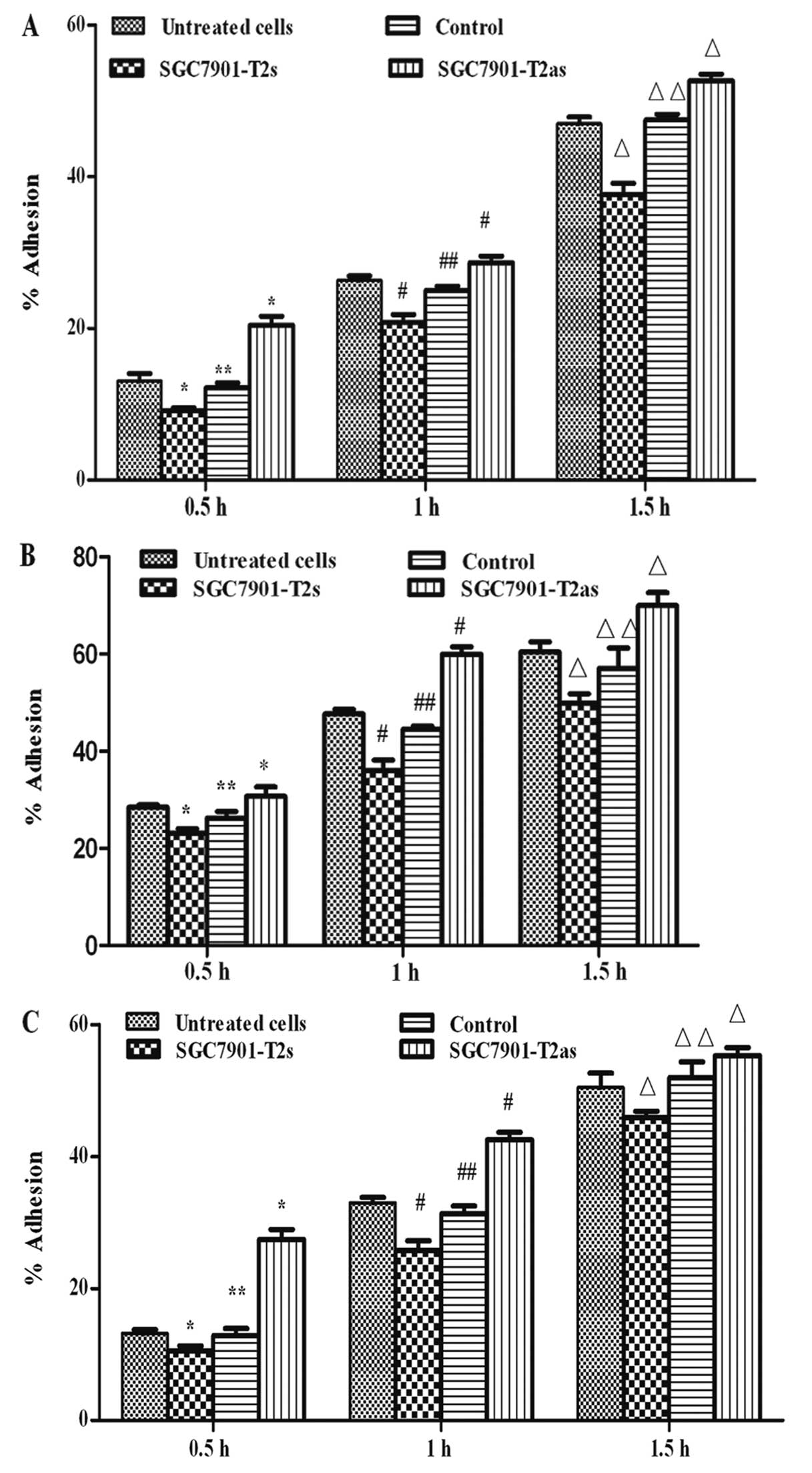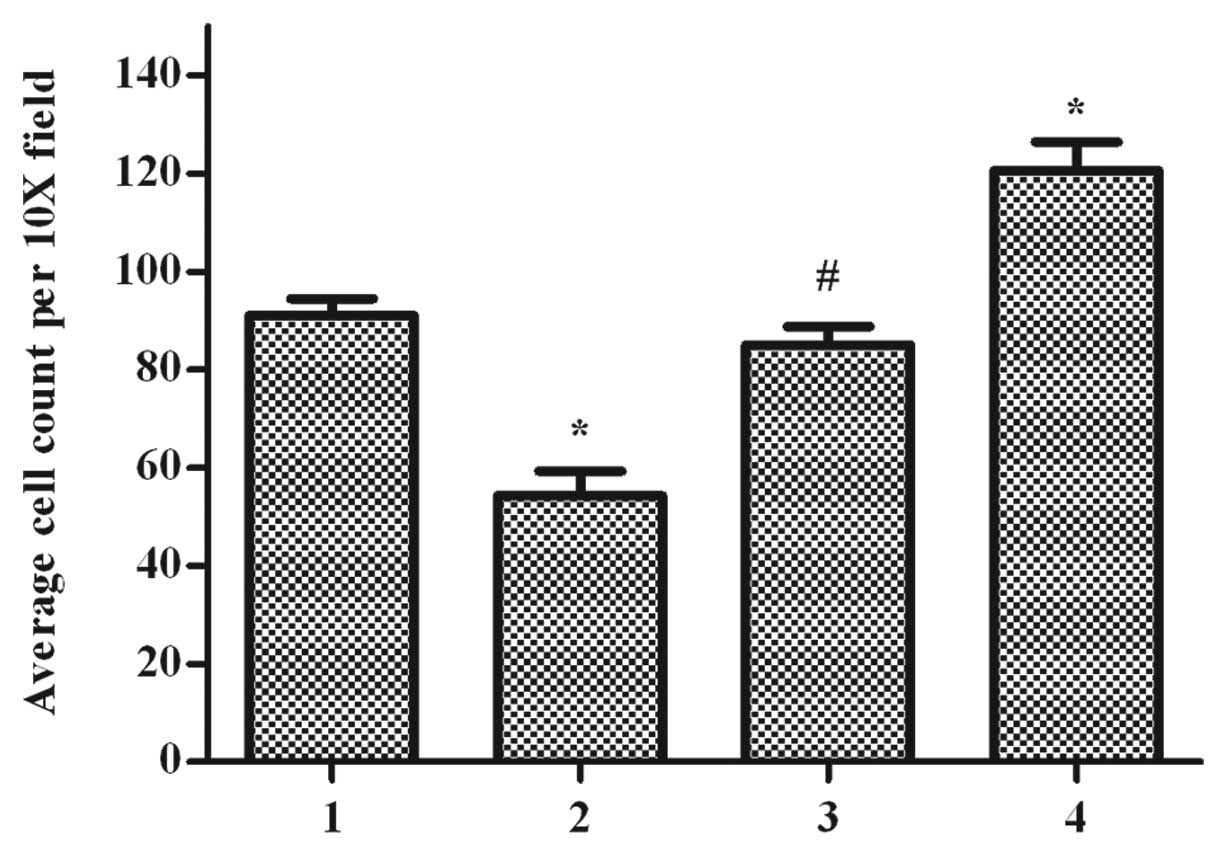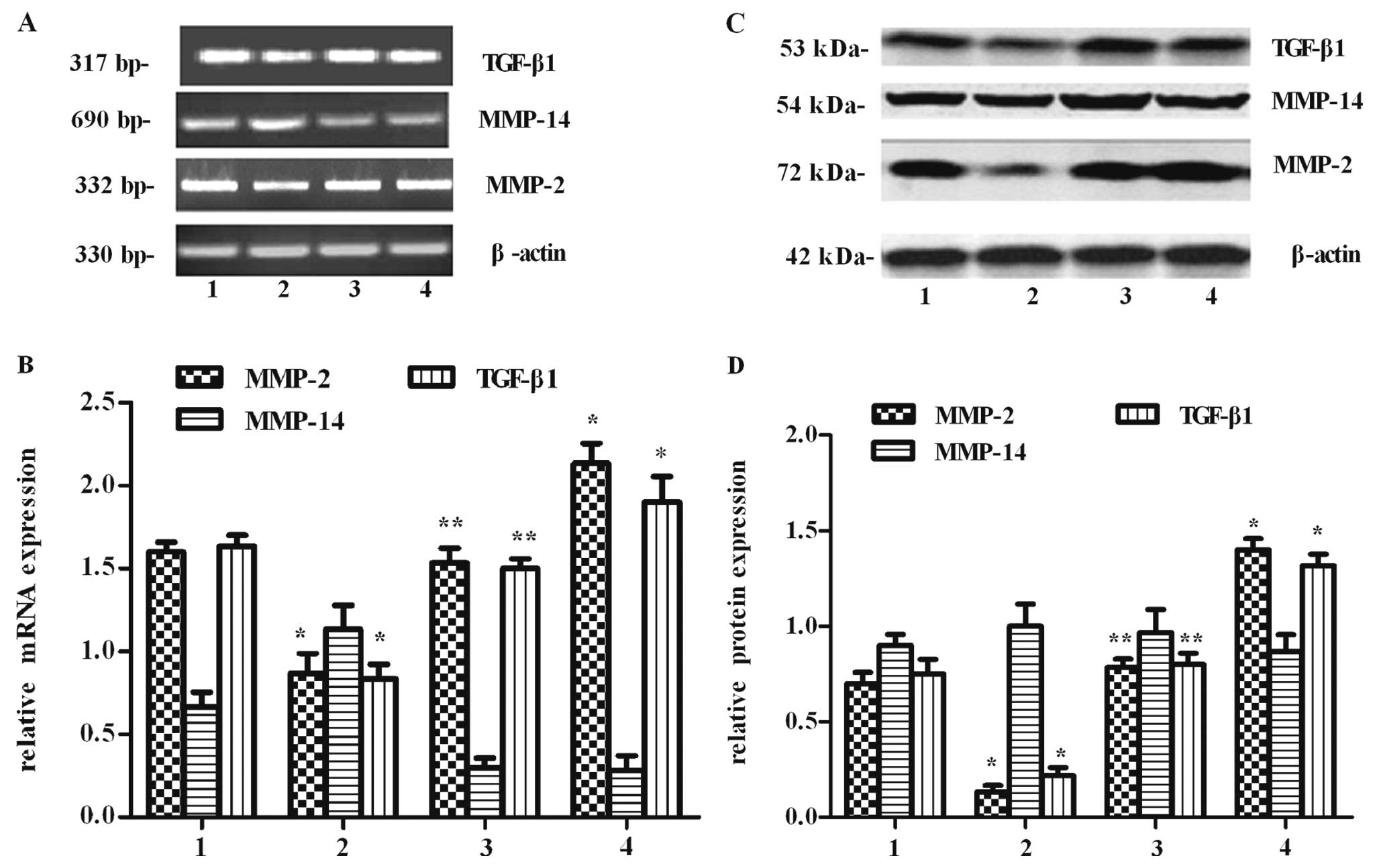|
1
|
Brooks SA, Carter TM, Bennett EP, Clausen
H and Mandel U: Immunolocalisation of members of the polypeptide
N-acetylgalactosaminyl transferase (ppGalNAc-T) family is
consistent with biologically relevant altered cell surface
glycosylation in breast cancer. Acta Histochem. 109:273–284. 2007.
View Article : Google Scholar
|
|
2
|
Zhang H, Meng F, Wu S, et al: Engagement
of I-branching {beta}-1, 6-N-acetylglucosaminyltransferase 2 in
breast cancer metastasis and TGF-{beta} signaling. Cancer Res.
71:4846–4856. 2011.PubMed/NCBI
|
|
3
|
Christie DR, Shaikh FM, Lucas JA IV, Lucas
JA III and Bellis SL: ST6Gal-I expression in ovarian cancer cells
promotes an invasive phenotype by altering integrin glycosylation
and function. J Ovarian Res. 1:32008. View Article : Google Scholar : PubMed/NCBI
|
|
4
|
Meany DL and Chan DW: Aberrant
glycosylation associated with enzymes as cancer biomarkers. Clin
Proteomics. 8:72011. View Article : Google Scholar : PubMed/NCBI
|
|
5
|
Petretti T, Schulze B, Schlag PM and
Kemmner W: Altered mRNA expression of glycosyltransferases in human
gastric carcinomas. Biochim Biophys Acta. 1428:209–218. 1999.
View Article : Google Scholar : PubMed/NCBI
|
|
6
|
Chandrasekaran EV, Xue J, Piskorz C, et
al: Potential tumor markers for human gastric cancer: an elevation
of glycan:sulfotransferases and a concomitant loss of
alpha1,2-fucosyltransferase activities. J Cancer Res Clin Oncol.
133:599–611. 2007. View Article : Google Scholar
|
|
7
|
Shimizu F, Nakayama J, Ishizone S, et al:
Usefulness of the real-time reverse transcription-polymerase chain
reaction assay targeted to alpha1,4-N-acetylglucosaminyltransferase
for the detection of gastric cancer. Lab Invest. 83:187–197. 2003.
View Article : Google Scholar
|
|
8
|
Liu Z, Shen L, Xu L, Sun X, Zhou J and Wu
S: Downregulation of β-1,3-N-acetylglucosaminyltransferase-8 by
siRNA inhibits the growth of human gastric cancer. Mol Med Rep.
4:497–503. 2011.
|
|
9
|
Zlocowski N, Sendra VG, Lorenz V, et al:
Catalytic and glycan-binding abilities of ppGalNAc-T2 are regulated
by acetylation. Biochem Biophys Res Commun. 410:140–145. 2011.
View Article : Google Scholar : PubMed/NCBI
|
|
10
|
Li X, Wang J, Li W, et al:
Characterization of ppGalNAc-T18, a member of the
vertebrate-specific Y subfamily of
UDP-N-acetyl-alpha-D-galactosamine: polypeptide
N-acetylgalactosaminyltransferases. Glycobiology. 22:602–615. 2012.
View Article : Google Scholar : PubMed/NCBI
|
|
11
|
Peng C, Togayachi A, Kwon YD, et al:
Identification of a novel human UDP-GalNAc transferase with unique
catalytic activity and expression profile. Biochem Biophys Res
Commun. 402:680–686. 2010. View Article : Google Scholar : PubMed/NCBI
|
|
12
|
Mandel U, Hassan H, Therkildsen MH, et al:
Expression of polypeptide GalNAc-transferases in stratified
epithelia and squamous cell carcinomas: immunohistological
evaluation using monoclonal antibodies to three members of the
GalNAc-transferase family. Glycobiology. 9:43–52. 1999. View Article : Google Scholar
|
|
13
|
Gao Y, Tu YB, Guo Y, et al: PpGalNacT2
participating in vanadium-induced HL-60 cell differentiation. Mol
Biol Rep. 38:1483–1489. 2011. View Article : Google Scholar : PubMed/NCBI
|
|
14
|
Liu C, Lin D, Xu L, Jiang Z, Zhou Y and Wu
S: An anti-human ppGalNAcT-2 monoclonal antibody. Hybridoma.
30:549–554. 2011. View Article : Google Scholar : PubMed/NCBI
|
|
15
|
Liu J, Yang L, Jin M, Xu L and Wu S:
regulation of the invasion and metastasis of human glioma cells by
polypeptide N-acetylgalactosaminyltransferase 2. Mol Med Rep.
4:1299–1305. 2011.PubMed/NCBI
|
|
16
|
Shen L, Liu Z, Tu Y, Xu L, Sun X and Wu S:
Regulation of MMP-2 expression and activity by
beta-1,3-N-acetylglucosaminyltransferase-8 in AGS gastric cancer
cells. Mol Biol Rep. 38:1541–1550. 2011. View Article : Google Scholar : PubMed/NCBI
|
|
17
|
Milac AL, Buchete NV, Fritz TA, Hummer G
and Tabak LA: Substrate-induced conformational changes and dynamics
of UDP-N-acetylgalactosamine:polypeptide
N-acetylgalactosaminyltransferase-2. J Mol Biol. 373:439–451. 2007.
View Article : Google Scholar : PubMed/NCBI
|
|
18
|
Ten Hagen KG, Fritz TA and Tabak LA: All
in the family: the UDP-GalNAc:polypeptide
N-acetylgalactosaminyltransferases. Glycobiology. 13:1R–16R.
2003.PubMed/NCBI
|
|
19
|
Wei M, Wang Z, Yao H, et al: P27(Kip1),
regulated by glycogen synthase kinase-3beta, results in
HMBA-induced differentiation of human gastric cancer cells. BMC
Cancer. 11:1092011. View Article : Google Scholar : PubMed/NCBI
|
|
20
|
Zeng Y, Yang Z, Xu JG, Yang MS, Zeng ZX
and You C: Differentially expressed genes from the glioblastoma
cell line SHG-44 treated with all-trans retinoic acid in vitro. J
Clin Neurosci. 16:285–294. 2009. View Article : Google Scholar : PubMed/NCBI
|
|
21
|
Qiu H, Guo XH, Mo JH, Jin MF, Wu SL and
Chen HL: Expressions of polypeptide:
N-acetylgalactosaminyltransferase in leukemia cell lines during
1,25-dihydroxyvitamin D3 induced differentiation. Glycoconj J.
23:575–584. 2006. View Article : Google Scholar : PubMed/NCBI
|
|
22
|
Jia HP, Look DC, Shi L, et al: ACE2
receptor expression and severe acute respiratory syndrome
coronavirus infection depend on differentiation of human airway
epithelia. J Virol. 79:14614–14621. 2005. View Article : Google Scholar
|
|
23
|
Xu S, Mou H, Lu G, et al: Gene expression
profile differences in high and low metastatic human ovarian cancer
cell lines by gene chip. Chin Med J (Engl). 115:36–41.
2002.PubMed/NCBI
|
|
24
|
Langley RR and Fidler IJ: Tumor cell-organ
microenvironment interactions in the pathogenesis of cancer
metastasis. Endocr Rev. 28:297–321. 2007. View Article : Google Scholar : PubMed/NCBI
|
|
25
|
Fidler IJ: The organ microenvironment and
cancer metastasis. Differentiation. 70:498–505. 2002. View Article : Google Scholar : PubMed/NCBI
|
|
26
|
Li Y, Li B, Xiang CP, Zhang Y, Li YY and
Wu XL: Characterization of gastric cancer models from different
cell lines orthotopically constructed using improved implantation
techniques. World J Gastroenterol. 18:136–143. 2012. View Article : Google Scholar
|
|
27
|
Li HZ, Wang Y, Gao Y, et al: Effects of
raf kinase inhibitor protein expression on metastasis and
progression of human epithelial ovarian cancer. Mol Cancer Res.
6:917–928. 2008. View Article : Google Scholar : PubMed/NCBI
|
|
28
|
Li HZ, Gao Y, Zhao XL, et al: Effects of
raf kinase inhibitor protein expression on metastasis and
progression of human breast cancer. Mol Cancer Res. 7:832–840.
2009. View Article : Google Scholar : PubMed/NCBI
|
|
29
|
Gao M, Zhang JH, Zhou FX, et al:
Angelica sinensis suppresses human lung adenocarcinoma A549
cell metastasis by regulating MMPs/TIMPs and TGF-β1. Oncol Rep.
27:585–593. 2012.
|
|
30
|
Sato H, Takino T, Okada Y, et al: A matrix
metalloproteinase expressed on the surface of invasive tumour
cells. Nature. 370:61–65. 1994. View
Article : Google Scholar : PubMed/NCBI
|
|
31
|
Zucker S, Drews M, Conner C, et al: Tissue
inhibitor of metalloproteinase-2 (TIMP-2) binds to the catalytic
domain of the cell surface receptor, membrane type 1-matrix
metalloproteinase 1 (MT1-MMP). J Biol Chem. 273:1216–1222. 1998.
View Article : Google Scholar : PubMed/NCBI
|
|
32
|
Taipale J, Miyazono K, Heldin CH and
Keski-Oja J: Latent transforming growth factor-beta 1 associates to
fibroblast extra-cellular matrix via latent TGF-beta binding
protein. J Cell Biol. 124:171–181. 1994. View Article : Google Scholar : PubMed/NCBI
|















